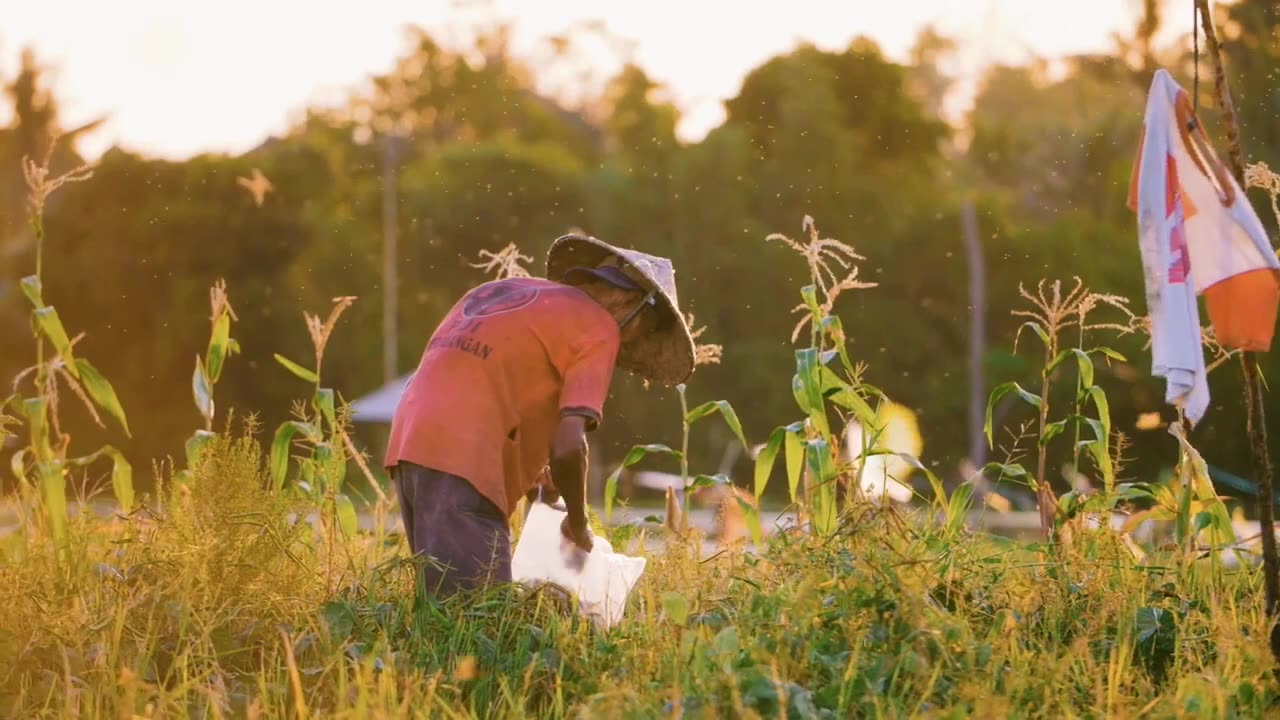Premium Only Content

cinematic farmers in the fields
A rice farmer, also known as a paddy farmer or a wetland farmer, is an individual engaged in the cultivation of rice crops in a field called a paddy or a rice paddy. These farmers play a vital role in agricultural production, particularly in regions where rice is a staple food.
Rice farming is typically conducted in low-lying areas with a sufficient water supply, such as floodplains or terraced fields. The process involves several stages, starting with the preparation of the field. Farmers often use plowing and leveling techniques to create a flat surface suitable for water irrigation.
Once the field is ready, the farmer plants rice seeds. This can be done manually by scattering the seeds across the field or by using mechanical seeders for larger areas. After planting, the field is flooded with water, providing an ideal environment for rice growth. The water also helps control the growth of weeds that might compete with the rice plants.
The rice plants go through different stages of growth, including germination, tillering, and heading. During these stages, farmers closely monitor the field, ensuring that the crop receives adequate sunlight, nutrients, and water. They may use fertilizers and pesticides to promote healthy plant growth and protect the crop from pests and diseases.
As the rice plants mature, they develop panicles containing grains of rice. Once the grains are fully formed and the plants begin to turn yellow, it is an indication that the crop is ready for harvesting. Harvesting techniques vary, but they generally involve cutting the rice stalks and collecting the harvested crop.
After harvesting, the rice is typically dried and threshed to separate the grains from the husks. The grains are then processed further to remove the outer layers and polished to enhance their appearance. Finally, the rice is ready for consumption or storage.
Rice farming is often a labor-intensive and time-sensitive activity. Farmers work long hours during planting and harvesting seasons to ensure a successful crop. They rely on their knowledge, experience, and observation skills to make informed decisions about water management, pest control, and crop rotation.
The work of rice farmers contributes significantly to food security and the economy in many regions. Their dedication and expertise in cultivating rice sustain the livelihoods of millions of people worldwide and play a crucial role in providing a stable food supply.
-
 1:28:42
1:28:42
Redacted News
5 hours agoBREAKING! SOMETHING BIG IS HAPPENING IN EUROPE ALL OUT WAR IS COMING AGAINST RUSSIA, TRUMP FURIOUS
108K263 -
 47:50
47:50
Candace Show Podcast
6 hours agoBREAKING: Judge Makes Statement Regarding Taylor Swift's Text Messages. | Candace Ep 155
94.3K108 -
 DVR
DVR
Josh Pate's College Football Show
3 hours ago $0.29 earnedCFB’s Most Hated Teams | FSU & Clemson Future | Big Ten Win Totals | Star Rankings Overrated?
5.76K -
 1:33:47
1:33:47
CatfishedOnline
4 hours agoGoing Live With Robert - Weekly Recap
27.8K -
 55:18
55:18
LFA TV
1 day agoEurope’s Sudden Turn Against America | TRUMPET DAILY 3.6.25 7PM
32.2K3 -
 4:21
4:21
Tundra Tactical
4 hours ago $1.38 earnedPam Bondi MUST Enforce Due Process NOW!
18.4K1 -
 56:42
56:42
VSiNLive
5 hours agoFollow the Money with Mitch Moss & Pauly Howard | Hour 1
43.6K1 -
 1:05:32
1:05:32
In The Litter Box w/ Jewels & Catturd
1 day agoShalom Hamas | In the Litter Box w/ Jewels & Catturd – Ep. 756 – 3/6/2025
98.7K37 -
 1:23:00
1:23:00
Sean Unpaved
7 hours ago $3.19 earnedNFL Free Agency
53.4K3 -
 18:25
18:25
Stephen Gardner
6 hours ago🔥The REAL REASON the Epstein Files are being HIDDEN | I CONFRONT Alan Dershowitz for details!
63.3K111